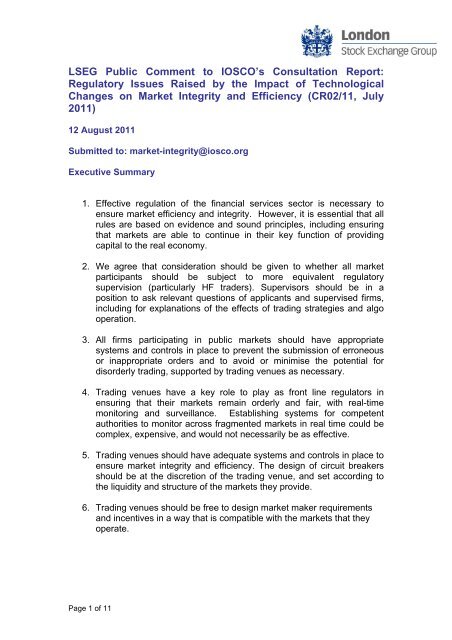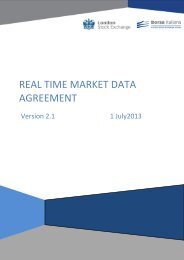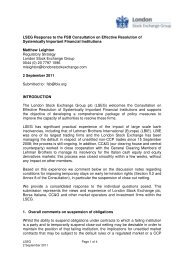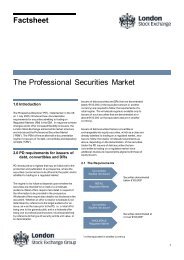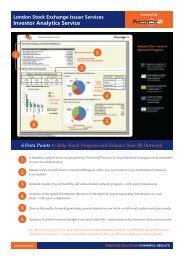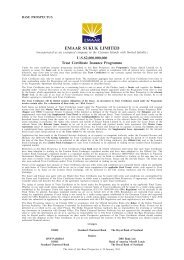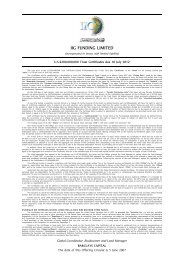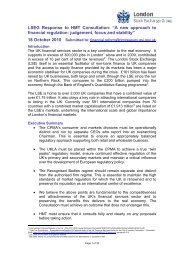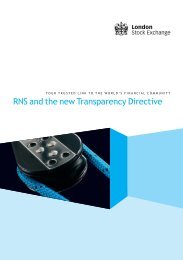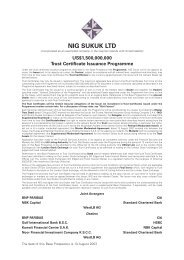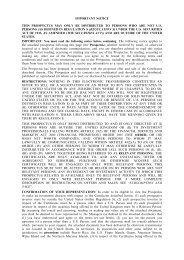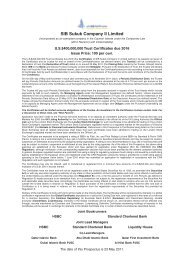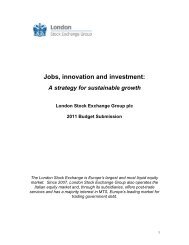LSEG Response to IOSCO Consultation - London Stock Exchange
LSEG Response to IOSCO Consultation - London Stock Exchange
LSEG Response to IOSCO Consultation - London Stock Exchange
You also want an ePaper? Increase the reach of your titles
YUMPU automatically turns print PDFs into web optimized ePapers that Google loves.
21 In practical terms, it is unlikely that in extreme market conditions marketmakers would continue <strong>to</strong> provide prices, regardless of the regula<strong>to</strong>ryrequirements upon them. The risk of a censure or a fine from an RM, MTF oreven a Competent Authority could seem less significant when set against thepotential risk of significant financial loss or insolvency from meeting manda<strong>to</strong>ryobligations <strong>to</strong> continue <strong>to</strong> quote prices in fast-moving and volatile markets whennot in their interests. The fine is likely <strong>to</strong> be a small price <strong>to</strong> pay for stepping ou<strong>to</strong>f the path of the oncoming train.22 Finally, we do not support the use of stub quotes. If market makers are able <strong>to</strong>be absent from the market for a period of time in periods of high volatility, andthose markets themselves use volatility controls, then stub quotes will be notbe necessary.Question 6 – Do you have suggestions for improvements <strong>to</strong> regula<strong>to</strong>rs’surveillance capabilities with respect <strong>to</strong> the markets and modern tradingtechniques? Please elaborate.Who should bear the cost of investing in such capabilities and the cost ofoperating and supervising the markets in order <strong>to</strong> ensure fairness amongmarket participants? Please elaborate.23 Trading venues have a role <strong>to</strong> play, as the front line regula<strong>to</strong>rs, in ensuring thattheir markets remain fair and orderly with real-time moni<strong>to</strong>ring and surveillance.We are aware that competent authorities may be considering enhancing theirsurveillance systems <strong>to</strong> have a real-time view of the markets. This is likely <strong>to</strong> becomplex and expensive <strong>to</strong> implement and may not necessarily be effective –especially across the larger fragmented equity markets in Europe, and acrossEU member states.24 A distinction should be drawn between market abuse, which is a criminal act,and market disruption or an activity having an impact on market integrity, whichcan be the result of erroneous orders and so called “fat finger” errors. MarketAbuse is difficult <strong>to</strong> detect and respond <strong>to</strong> in real-time; it often requiresextensive investigation after the event, using transaction data that can takeseveral weeks or even months <strong>to</strong> analyse. Market disruption can be detectedmore easily in real-time, and dealt with rapidly by trading venues in theircapacity of ensuring orderly and fair markets.25 Therefore, although real-time capabilities are required for trading venues <strong>to</strong>ensure orderly trading, we do not see that they would be required by regula<strong>to</strong>rs<strong>to</strong> moni<strong>to</strong>r for market abuse – certainly not for the cost that would be required<strong>to</strong> achieve such real-time surveillance in larger and fragmented equity marketssuch as the UK. In Europe, competent authorities already receive transactiondata at the end of the day, and may request further data from investment firmsand trading venues if they believe that a case of market abuse exists.Page 7 of 11
Question 7 – What do you perceive as the major causes of settlementindiscipline and settlement failures? What steps, if any, do you believeregula<strong>to</strong>rs should take <strong>to</strong> address these causes?26 We are uncertain as <strong>to</strong> the premise of this question, and note that there is nodiscussion in the <strong>Consultation</strong> paper regarding settlement failure or discipline.Notwithstanding this, if the point of the question is whether HFT and au<strong>to</strong>matedtrading gives rise <strong>to</strong> settlement failure or indiscipline, we do not accept such apremise. There is a popular misconception that intra-day trading, whether HFTor not, has an impact on the shareholding position in the issuers’records/registers; in many cases it does not. In our experience, intra-daytraders rarely hold a large inven<strong>to</strong>ry of s<strong>to</strong>ck, and therefore their trades rarelygo through <strong>to</strong> the settlement process.27 We estimate that approximately 98.4 per cent of all trades settle within fourdays of the Intended Settlement Date (ISD) 8 for all securities that trade on the<strong>London</strong> S<strong>to</strong>ck <strong>Exchange</strong>, and over 99 per cent of trades settle by the ISD inItaly. 9Question 8 – Have the appropriate steps been taken <strong>to</strong> limit or manageconflicts of interest that arise where an investment firm simultaneouslyconducts client-serving activities and proprietary trading or a tradingparticipant is also a shareholder in a venue on which it trades? If you believeconflicts management is inadequate, please explain how this manifests itselfand any recommendation you have for how conflicts management could beimproved.28 We are unaware of any problems that have arisen as a result of a conflict ofinterest. This does not present any particular new problem not already coveredby the existing Conduct of Business rules. We would also make the generalpoint that all firms and platforms should have adequate policies in place <strong>to</strong>manage such conflicts effectively, and that the regula<strong>to</strong>ry compliancedepartment within such firms should be sufficiently independent.Question 9 – Do you think existing laws and rules on market abuse anddisorderly trading cover computer generated orders and are relevant in <strong>to</strong>day’smarket environment?29 In general, we believe that existing laws and rules on market abuse anddisorderly trading in Europe are still relevant and applicable in <strong>to</strong>day’s marketenvironment. Computer generated trading has not, in our view, given rise <strong>to</strong>any new types of abuse, namely the means by which it may be undertaken orthe speed. However, it may be useful <strong>to</strong> have more illustrative guidance andexamples of what may constitute market abuse and disorderly behaviour inmarkets.8 Source: CREST9 Source: Monte Ti<strong>to</strong>liPage 8 of 11
traded in more than one venue, or which have active s<strong>to</strong>ck options or s<strong>to</strong>ckfutures, also typically have higher order-<strong>to</strong>-trade ratios.35 <strong>IOSCO</strong> will be aware of the work done by the Canadian authorities regarding aregula<strong>to</strong>ry fee structure that imposes a cost in proportion <strong>to</strong> a marketparticipant’s order activity, rather than executed trades; it would be interesting<strong>to</strong> see whether this had any measurable impact on trading strategies.Question 12 – Should market opera<strong>to</strong>rs be required <strong>to</strong> make their co-locationservices available on a fair and non-discrimina<strong>to</strong>ry basis?36 We agree that access <strong>to</strong> co-location facilities should be provided on a nondiscrimina<strong>to</strong>rybasis. The same market access offering and related incentivesshould be offered <strong>to</strong> all participants. This should not mean that co-locationspace has <strong>to</strong> be limitless – provided it is open <strong>to</strong> all market participants then itshould be a commercial service based on supply and demand and should beable <strong>to</strong> be priced accordingly.37 In assessing co-location from the point of view of fair market access, we wouldalso highlight that the information provided on the costs and speeds of colocationmust be correct, clear and not misleading, so that market participantsare unambiguously and transparently informed about costs and technicalspecifications.Question 13 – Should market opera<strong>to</strong>rs be required <strong>to</strong> provide testingenvironments <strong>to</strong> enable participants in stress test their algorithms? If so, whatkind of minimum requirements are reasonable?38 We do not believe that market opera<strong>to</strong>rs should be required <strong>to</strong> provide testingenvironments for stress testing algorithms. To do so would be incredibly difficult<strong>to</strong> achieve in practice and expensive <strong>to</strong> implement, as it would requiresimulating a trading environment with parameters that may change in response<strong>to</strong> different externalities (and are therefore difficult <strong>to</strong> model).39 However, the <strong>London</strong> S<strong>to</strong>ck <strong>Exchange</strong> Group does provide range of cus<strong>to</strong>mertesting services that allow our members <strong>to</strong> test their systems, and ensure thatthey are fully operational and effective. 10 It is our belief that all trading venuesmust offer this service as part of its arrangements for effective systems andcontrols.40 <strong>LSEG</strong> also stress tests its systems <strong>to</strong> ensure that their capacity can meetdemand and handle potentially high message volumes during times of highmarket volatility. Further, as discussed in question 4, volatility controls andcircuit breakers are deployed <strong>to</strong> ensure that trading in particular financialinstruments remains orderly. We consider that this is a more effective way ofmaintaining orderly markets.10 For more information, please visit http://www.londons<strong>to</strong>ckexchange.com/products-andservices/technical-library/cus<strong>to</strong>mer/cus<strong>to</strong>mer-testing-services.htmPage 10 of 11
Question 14 – To what extent do you have other comments related <strong>to</strong> the risks<strong>to</strong> market integrity and efficiency raised by the issues in this report?41 We have no further views <strong>to</strong> add at this timePage 11 of 11


